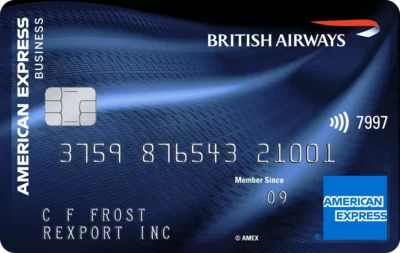We have our first example of Avios / Nectar fraud
Links on Head for Points may support the site by paying a commission. See here for all partner links.
Last week I wrote an article explaining why Avios fraud may be about to increase, and why you should ensure your account is secure.
Stealing frequent flyer miles is not usually a priority. The requirement to pay for the taxes on the flight you book with a credit card, as well as giving your real name and passport details whilst booking, is not attractive to thieves. This is why British Airways Executive Club accounts are not a top target for hackers.
Now things have changed. Hack into an BA account and you can transfer 50,000 Avios onto a random Nectar card, giving the thief £400 to spend.

We have our first hacked reader
Last night I got an email from a reader who had, literally, discovered that he had been hacked an hour before he contacted me.
The reader had checked his email and found around 70 random pieces of content. “They were all sign ups to weird sites, requests for quotes to Mexican transport companies etc” he wrote.
Halfway through the list was the email from British Airways Executive Club saying that his account had been linked to a Nectar account.
Cunningly, the hacker had hoped that by spamming the inbox with a large amount of content at once, the Nectar email would be missed.
The email said: “Congratulations, your British Airways Executive Club account has successfully been linked to a Nectar account ending in 9013.”
The reader quickly logged in to his British Airways Executive Club account. 50,000 Avios – the monthly maximum – had been transferred to the Nectar card.
(Our reader does have a Nectar card, but it doesn’t end in 9013. He had not yet linked it to his BA account.)
He called British Airways Executive Club and it locked his account. He has been promised an email from BA “in a couple of weeks”.
It is worth noting that our reader was impacted by the British Airways data breach a couple of years ago, during which his Executive Club account details would have been stolen. It isn’t clear if this is connected or not. It is possible that his details are amongst those BAEC accounts being sold on the ‘dark web’.
Conclusion
As I wrote in my article last week, the Avios / Nectar security is lax. There is no attempt to match surnames or email addresses. You can even link and unlink Nectar cards between multiple accounts.
It is possible that the hacker got away with it. Whilst the reader had his British Airways account locked, BA could not lock his Nectar account.
As long as the hacker had already used the Nectar card once, he could immediately head into Sainsbury’s and spend £400. More likely, he will have ordered £400 of eBay credit and used it to buy something from another eBay account under his control.
PS. It turns out we have had a 2nd example of fraud amongst our readers. After this article was published, someone else got in touch.
“Same thing happened to us too! We got an email saying our Executive Club account had been linked to a Nectar account. And 50k Avios were transferred out. We contacted both BA and Nectar but so far no news (BA said it could take up to 28 days for their audit team to investigate but they said we should get our Avios back).”

How to earn Avios from UK credit cards (April 2024)
As a reminder, there are various ways of earning Avios points from UK credit cards. Many cards also have generous sign-up bonuses!
In February 2022, Barclaycard launched two exciting new Barclaycard Avios Mastercard cards with a bonus of up to 25,000 Avios. You can apply here.
You qualify for the bonus on these cards even if you have a British Airways American Express card:

Barclaycard Avios Plus Mastercard
Get 25,000 Avios for signing up and an upgrade voucher at £10,000 Read our full review

Barclaycard Avios Mastercard
5,000 Avios for signing up and an upgrade voucher at £20,000 Read our full review
There are two official British Airways American Express cards with attractive sign-up bonuses:

British Airways American Express Premium Plus
25,000 Avios and the famous annual 2-4-1 voucher Read our full review

British Airways American Express
5,000 Avios for signing up and an Economy 2-4-1 voucher for spending £15,000 Read our full review
You can also get generous sign-up bonuses by applying for American Express cards which earn Membership Rewards points. These points convert at 1:1 into Avios.

American Express Preferred Rewards Gold
Your best beginner’s card – 20,000 points, FREE for a year & four airport lounge passes Read our full review

The Platinum Card from American Express
40,000 bonus points and a huge range of valuable benefits – for a fee Read our full review
Run your own business?
We recommend Capital on Tap for limited companies. You earn 1 Avios per £1 which is impressive for a Visa card, along with a sign-up bonus worth 10,500 Avios.
SPECIAL OFFER: Until 12th May 2024, the Capital on Tap Business Rewards Visa card is offering a bonus of 30,000 points, convertible into 30,000 Avios. You must have a Limited Company to apply. Click here to learn more and click here to apply.

Capital on Tap Business Rewards Visa
Huge 30,000 points bonus until 12th May 2024 Read our full review
You should also consider the British Airways Accelerating Business credit card. This is open to sole traders as well as limited companies and has a 30,000 Avios sign-up bonus.

British Airways Accelerating Business American Express
30,000 Avios sign-up bonus – plus annual bonuses of up to 30,000 Avios Read our full review
There are also generous bonuses on the two American Express Business cards, with the points converting at 1:1 into Avios. These cards are open to sole traders as well as limited companies.

American Express Business Platinum
40,000 points sign-up bonus and an annual £200 Amex Travel credit Read our full review

American Express Business Gold
20,000 points sign-up bonus and FREE for a year Read our full review
Click here to read our detailed summary of all UK credit cards which earn Avios. This includes both personal and small business cards.









Comments (166)